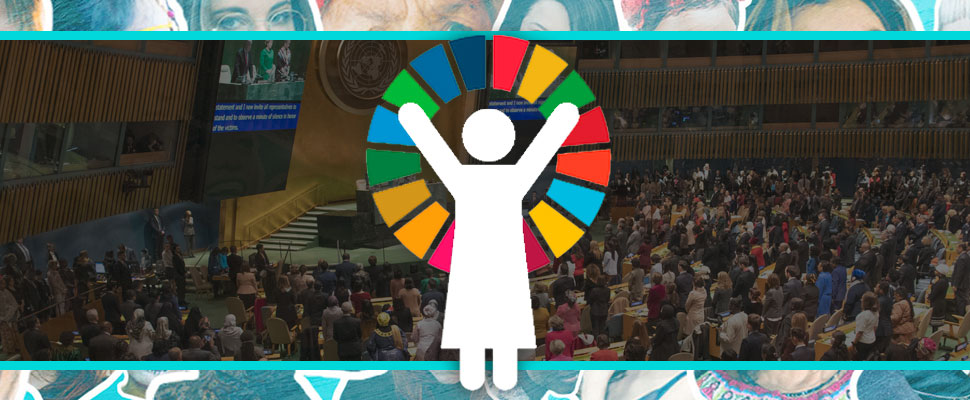UN: “Without women in politics, human rights and peace would be at risk”
Listen this article
In the framework of the celebration of the 63rd edition of the Commission on the Status of Women, women united to promote equality

From March 11 to March 22, the 63rd edition of the Commission on the Status of Women is held, which is "the main world intergovernmental body dedicated exclusively to the promotion of gender equality and the empowerment of women and girls", according to Ilga.
In this edition, topics were discussed around "social protection systems, access to public services and sustainable infrastructure for gender equality and the empowerment of women and girls," according to the official UN website.
This is how through different meetings important issues for women were discussed, such as infrastructure, such as the case of a road in Cameroon, which plans to serve more than 20,000 women living in rural communities. This with the purpose that they can have a better future, because "the project teaches financial and business skills and better agricultural techniques and facilitates access to public services and land rights," according to the same page.
Lack of information among #WomenWithDisabilities & their families about their legal rights including right to legal representation, prevents many from advocating for their needs. Public institutions should consider this in their processes & make room for equitable services #CSW63 pic.twitter.com/rqRNoybUqQ
— UAF-Africa (@UAFAfrica) 13 de marzo de 2019
Similarly, stories related to public services were heard, such as the need to ask for daycare centers in Georgia, which allow the work of women who have children and do not have anyone to care for them. In addition, the issue of social protection was also discussed, such as the case of domestic workers in Guatemala, who fight for full recognition and remuneration for their work.
Greater female participation
On the other hand, according to the report presented by the president of the General Assembly, María Fernanda Espinosa, 90% of the Heads of State and Government are men, as well as 76% of the parliamentarians. She also stressed that women in politics face great barriers "from resistance within their own parties to double standards, and discriminatory treatment in certain media".
Regarding positive aspects, she mentioned the benefits of women's participation in politics, because she highlighted the economic stability, the strengthening of different institutions, "the progress in the reforms of discriminatory laws and an increase in investment in key areas such as health, education and social protection".
She also stressed the importance of joining forces to promote women's leadership: "I want to make a call to action. We must create awareness and join efforts to enhance the leadership of women in all spaces. Without women in politics, sustainable development, human rights, and peace are seriously compromised".
Lack of information among #WomenWithDisabilities & their families about their legal rights including right to legal representation, prevents many from advocating for their needs. Public institutions should consider this in their processes & make room for equitable services #CSW63 pic.twitter.com/rqRNoybUqQ
— UAF-Africa (@UAFAfrica) 13 de marzo de 2019
Maybe you're interested in reading: Latin America: 4 women who sweep politics
Colombia and the empowerment of women
Marta Lucia Ramirez, the first vice president of Colombia, stressed the importance of teaching girls "to think for themselves, to analyze what options they have, to decide the career that best suits them, to take on challenges, to be transformative, valued, to have self-esteem, to love oneself, to trust in themselves, to dare to be the first, to seek power, to ask for a salary increase when they feel they deserve it", according to El Tiempo.
She also highlighted the importance of promoting female leadership in girls from mothers and educators. However, despite affirming that Colombia has a "robust framework" of laws in favor of women's rights, the country is still far from achieving equality.
Finally, she stressed the importance that "national agendas should articulate in an integral manner the different aspects of gender equality. Women must be offered access to better quality education, to employment, and entrepreneurship that provides economic security".
#AHORA: Vicepresidenta de la República de Colombia, @mluciaramirez:”Nuestro país está convencido de que debemos empoderar a las mujeres económicamente, políticamente y así avanzaremos mucho más” #MujeresFMBBVA #CSW63 pic.twitter.com/xv3EXzdoak
— Microfinanzas BBVA (@FMBBVA) 13 de marzo de 2019
LatinAmerican Post | Laura Viviana Guevara Muñoz
Translated from "ONU: "Sin mujeres en la política, los derechos humanos y la paz estarían comprometidos"





